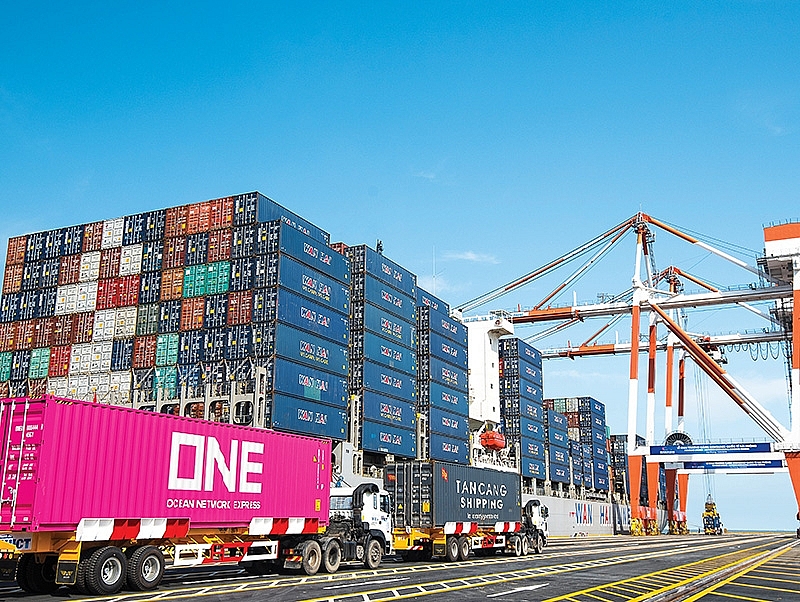Asian Development Bank country director for Vietnam Eric Sidgwick provides insight on the country’s efforts to regain its growth momentum after the pandemic.
 |
| Asian Development Bank country director for Vietnam Eric Sidgwick |
I would like to extend congratulations to the Vietnamese government and people on their timely and effective actions against the COVID-19 pandemic.
Though being a developing nation facing numerous difficulties, Vietnam has become a role model for the whole world in effectively fighting against the disease.
The outbreak has imposed far-reaching negative impacts on almost all nations in the world. All socio-economic, trade, and service activities have to be restricted as many nations have to declare emergency and apply social distancing policies in a bid to restrain the pandemic spread.
Many economic experts have said that the pandemic has caused losses that are far greater than those induced by the global financial crisis happening more than a decade ago.
COVID-19 may throw economies into recession. Regionally, it has been inflicting a significant impact on developing Asian economies including Vietnam through numerous channels, including sharp declines in domestic demand, lower tourism and business travel, trade and production linkages, supply disruptions, and health effects.
According to a recent report by the Asian Development Bank (ADB), following preventive activities and measures against coronavirus applied by nations after three months, such as travelling bans, the range of scenarios suggest a global impact ranging from $77 billion to $347 billion or 0.1 per cent to 0.4 per cent of global GDP, with a moderate-case estimate of $156 billion or 0.2 per cent of global GDP.
Across all the scenarios, China accounts for roughly two-thirds of the global impact; in the moderate scenario the loss to China relative to a no-outbreak scenario is $103 billion, or close to 0.8 per cent of this nation’s GDP. The rest of the impact on the global economy is split roughly equally between the impact on the rest of developing Asia, and on the rest of the world. The rest of developing Asia would experience a loss of $22 billion or 0.24 per cent of its GDP under the moderate-case scenario.
Also under the report, damage caused by the pandemic to the Vietnamese economy will be between $675 million and $3.7 billion, depending on the level of the pandemic’s expansion, equivalent to 0.3-1.4 per cent of GDP. The sectors the most affected include industry, agriculture, and services.
Due to the pandemic and slashed demand from nations that are Vietnam’s key trade and investment partners, in the first quarter of 2020 the country’s economic growth declined sharply to 3.82 per cent on-year, far lower than the on-year 6.8 per cent in the same period last year. Travel and other restrictions imposed by the government to slow the spread of COVID-19 led to lower domestic consumption.
Manufacturing managed to weather the headwinds early on but the inventory of inputs, including those part of global value chains, are being depleted. Growth in agriculture stagnated because of lower demand for sector exports and severe salinity intrusion in the Mekong Delta.
Growth in services, the sector hardest hit by the pandemic, was halved to 3.2 per cent in the first quarter of 2020, down from 6.5 per cent in the corresponding period in 2019.
 |
| Ensuring greater economic triumphs. Photo: Le Toan |
Economic outlook
Vietnam is now striving to mitigate negative impacts from COVID-19 and from the subsequent and ongoing drop in demand from its principal trade and investment partners. In such circumstances, the ADB has expected the country’s economic growth to slow sharply in 2020, to 4.8 per cent.
However, the economy’s fundamentals remain resilient. If the pandemic is contained within the first half of 2020, growth should rebound to 6.8 per cent in 2021 – the ADB’s pre-pandemic forecast for Vietnam in 2020 - and remain strong over the medium and long-term.
To support economic activity, in early March the government unveiled a $10.8 billion (0.4 per cent of GDP) credit relief package of debt restructuring and lowered interest rates and fees. The government also launched a fiscal package worth $1.3 billion that reduces taxes and fees for affected firms and defers tax payment, and the fiscal support is expected to rise.
The State Bank of Vietnam (SBV) has continued applying a prudent monetary policy. It has also cut policy rates by 0.5-1 per cent, and lowered interest rate caps on VND deposits of less than six months and on short-term dong lending to prioritised sectors.
Lowering interest rates have further strengthened market confidence, facilitating enterprises to continue maintaining performance during the pandemic, and to boost development after it is controlled.
Despite the pandemic, drivers of economic growth – a growing middle-income class and a dynamic private sector – remain robust. Moreover, the country’s business environment continues to improve. Public spending to combat the impact of the pandemic, which rose significantly in January and February, will likely be raised further. Boosting public investment disbursement is one of the prioritised tasks that the government has assigned ministries, agencies, and localities to implement in 2020.
Opportunities
Despite the challenges, fair prospects are also open to Vietnam. The large number of bilateral and multilateral trade agreements Vietnam participates in, which promise improved market access, will help the country’s economy rebound.
Vietnam would also benefit from the containment of the pandemic and eventual return of economic growth in China, which would help revive global value chains.
In another angle, Vietnam has rapidly integrated into the global economy and moved up the chain of value addition from agriculture to light manufacturing and on to electronics.
Over recent years, Vietnam has swiftly emerged as a significant value chain hub in Southeast Asia for the manufacturing of ICT hardware.
Vietnam had 38,861 ICT companies in 2018 and currently boasts 2,000-3,000 tech startups. Investment by large multinational companies and other foreign investors explains much of this rapid growth, but local companies are also growing quickly, notably in e-commerce and fintech. For its part, the government has issued new policies and regulations to encourage this development. The growth of the digital economy provides new opportunities for knowledge-intensive employment.
Vietnam ranked 42 among 129 countries in the Global Innovation Index 2019, rubbing shoulders with top economies classified as upper-middle income. This ranking reflected high ICT exports and imports. Vietnam has other advantages that should enable it to move up in the index. It has strong primary and lower-secondary education, a young population, abundant labor, and ample credit. Ensuring more and better fresh graduates is critical for Vietnam to leap ahead in technological innovation.
The pandemic is now raging in an increasingly complicated manner across the whole world. In order to meet the intermediate demand of developing member states in combating COVID-19, in early April, the ADB president Masatsugu Asakawa announced triple of COVID-19 response package to $20 billion and approved measures to streamline its operations for quicker and more flexible delivery of assistance.
The package expands the ADB’s $6.5 billion initial response on March 18, adding $13.5 billion in resources to help the bank’s developing member countries counter the severe macroeconomic and health impacts caused by COVID-19. The $20 billion package includes about $2.5 billion in concessional and grant resources.
At recent talks with Vietnamese Minister of Finance Dinh Tien Dung and SBV Governor Le Minh Hung, Asakawa affirmed that the ADB stands ready to provide financial assistance and policy advice to help the Vietnamese government contain the spread of COVID-19.
The ADB will consider all options, including quick-disbursing budget support, policy-based lending, and expedited disbursement of existing loans to ensure all support packages can be approved quickly and disbursed in a timely manner.
The ADB and other development partners highly commended the Vietnamese government for its timely and effective actions to combat the pandemic, welcoming the government’s focus on maintaining economic stability and growth in the medium- and long-term, including through expanding public investment expenditure and strengthening social safety nets for poor and vulnerable households.
With a firm economic foundations, we believe despite deceleration in economic activity and downside risks posed by the pandemic, Vietnam’s economic growth is projected to remain one of the highest in Southeast Asia. The situation will eventually be resolved, and Vietnam will soon regain its growth momentum. VIR

Economic growth slows as GDP rate threatened
Sticky projected prospects caused by the global health crisis among Vietnam’s key trading partners are expected to hit the domestic economy this year with the manufacturing and processing sector, one of the key growth pillars, to be hit hardest.

Improving productivity is shortest way to economic development
Director General of General Statistic Office of Việt Nam (GSO) Nguyen Bich Lam talks about the importance of improving labour productivity for the country’s development.
 Despite the negative impacts of the ongoing coronavirus pandemic, the Vietnamese economy under sturdy policies from the government will have numerous opportunities to move forwards strongly.
Despite the negative impacts of the ongoing coronavirus pandemic, the Vietnamese economy under sturdy policies from the government will have numerous opportunities to move forwards strongly.